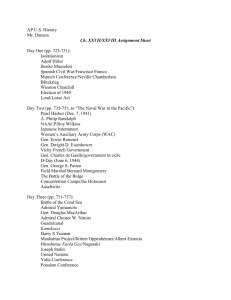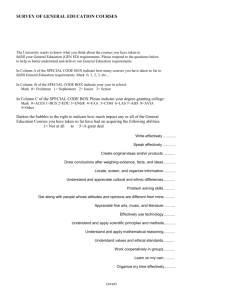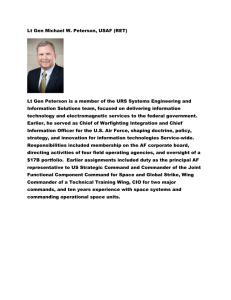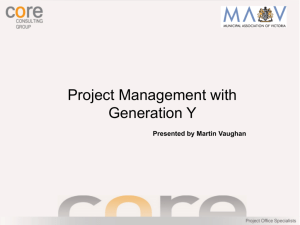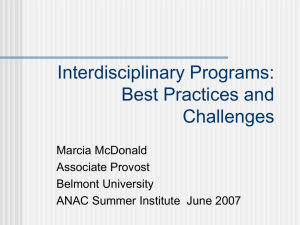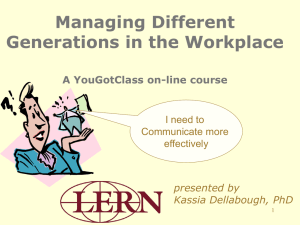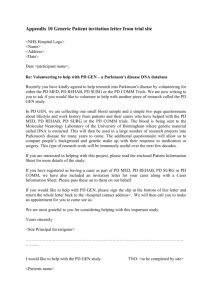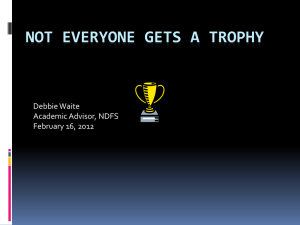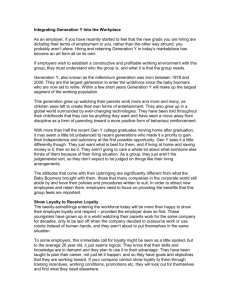across courses
advertisement
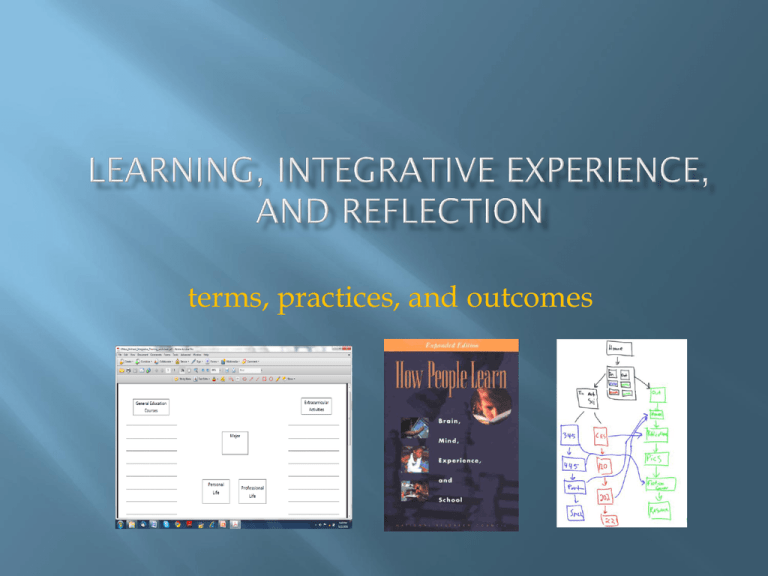
terms, practices, and outcomes What connections do we make? What about those connections is meaningful? across courses through reflection linked to the world Major as not in the center? Many connections, vertical as well as horizontal Connections annotated Major more integrated with gen ed Gen ed qualities rather than courses Role of the personal life How People Learn •Transfer •Prior Knowledge •Novices and Experts •Mental Maps •Contextualized Practice •Explicitness •Meta-cognition/ Reflection Meta-cognition Account of process Account of learning Synthesis: making knowledge Exploration The development of a theory Connection of prior and new knowledge Connection of the prior and the new in the context of the new Self-assessment generally Self-assessment in terms of outcomes Goal-setting Other . . . ENGLISH These guidelines include: an interdisciplinary component to the class that encourages students to draw links between more than one discipline; a reflective component that encourages students to reflect critically on the integration of their education; and a real-world component that encourages students to consider how the skills they have learned as English majors translate into other contexts. History 397X Ideas that Changed History: An Integrative Course UMass Amherst, Fall 2011 Course Description. This class is about history—how we conceptualize it, how we write it, how we use it. The class is not about a specific time or place but is about the nature of history in general. Some of the questions that will arise in the class about the discipline of history are: •Why do humans in general take an interest in history? •Why do people in some societies take more of an interest in history than in other societies? •How relevant is history to understanding and solving important problems in the world today? •What kind of problems lies outside the scope of history? •Is the study of history a science or an art? •How has the study of history changed since the eighteenth century—what is the history of history? •How does history relate to other disciplines such as economics and philosophy? The class fulfills the General Education Integrative Experience Requirement. •How has your basic vision of history been shaped by specific courses you have taken in your history major? •Has your work in history been affected by your other General Education courses? •If you have not yet thought of how your Gen Ed courses (other than HS) can relate to your major, how can you better connect these dots before you graduate? •History is generally not regarded as a “career track major—but how can you relate history to your intended professional goals? (1) Students will be asked to describe past Gen Ed and past history courses and to reflect on the implicit or explicit methodologies of those courses. (2) Students will give oral reports and do collaborative work. (3) Each student will be asked to link the study of history to a real world problem that interests them. They will research the problem and selectively apply their prior historical and Gen Ed learning in this project. Sport Management 1. 2. 3. 4. 5. Students will apply critical thinking skills and academic concepts to the development of strategic responses to real-world problems (IE Criterion Three); Students will reflect on their career goals and expectations, knowledge and skills developed through their sport management major, and Gen Ed learning experiences (IE Criterion One); Students will practice research, writing, and communication skills as they evaluate business situations and develop and support alternative solutions (IE Criterion Two); Students will work effectively as a team to identify and reach project goals (IE Criterion Two); and Students will apply and synthesize their prior work in the major through application to “real world” issues (IE Criterion Three). Geosciences Proposing a new 3 credit, multi-instructor, multi-theme, discussion-based seminar on the physical and human dimensions of real world problems in the fall, followed by a new 1 credit faculty- supervised individual project in the spring, to be presented at an end-of-year research symposium. Students will center their IE experience on applying what they have learned at UMass to addressing real-life environmental issues. The fall seminar will be focused on one or two issues (chosen each year by the instructors) which are current, critical, well-defined, and capable of being "solved," "mitigated," or "assessed" by an interdisciplinary team of geologists, earth systems scientists, and geographers. The spring semester will provide students a supervised opportunity to explore an issue in more depth. This project will culminate in a presentation at a departmental student research symposium. Anthropology The initial IE offering in Anthropology will be a modification of an existing class “Alternative Spring Break: Wampanoag Indigenous Program.” The course will integrate the Gen Ed learning objectives of critical thinking and taking interdisciplinary perspectives with the Anthropological learning objectives of reflection, community engagement, and the application of theory and methods. In addition, students will learn and practice oral communication within the community and present to the annual Native Studies Symposium. COMMON THEMES multiple contexts connections across contexts linkage to the world (another context) questions arising from this exploration the public/the world/audience EXPLORATION? ANSWERS/THEORIES? FINDINGS? ANTICIPATIONS? DIALOGIC? CLAIMS? EVIDENCE: TYPES? THE PERSONAL? EXAMPLES? MODELS? DESIGNING IE OUTCOMES (3 criteria) INFORMAL ASSIGNMENTS (prior: where have they been?) FORMAL ASSIGNMENTS (bringing what together?) (LINK BETWEEN THE TWO?) THE ROLE OF AUDIENCE CRITERIA? MODELS (academic, public) terms, practices, and outcomes

